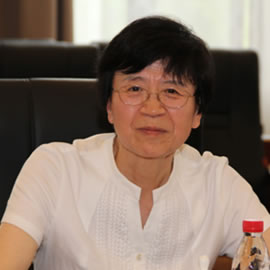WFCMS President's Speech
Constitution Ceremony of the Working Committee for Promoting
the Regulation of Chinese Medicine of WFCMS
Opening speech by Prof. She Jing
13th November 2016 (Auckland, New Zealand)

Good afternoon, ladies and gentleman.
Today, in the beautiful city of Auckland, we solemnly celebrate the formal constitution of the Working Committee for Promoting the Regulation of Chinese Medicine of WFCMS. In the first place, on behalf of WFCMS, I cordially and warmly congratulate the recently elected President, Vice-President, Secretary and the other members of the Executive Board of the Committee. In the same way, I would like to wholeheartedly welcome the participants coming from different parts of the world, and thank institutions, experts and colleagues who have worked intensely on the preparations for this event.
WFCMS is an international academic organization of Chinese medicine based in Beijing which was established in 2003. It currently has 251 member organizations from 67 countries and regions, is an official NGO member of WHO, an advisory institution for the Intangible Cultural Heritage of UNESCO, and a liaison committee category A to ISO/TC249 TCM. Moreover, it maintains a close collaborative relationship with TRAFFIC (the wildlife trade monitoring network) and WWF (World Wide Fund for Nature). It plays an active role in strengthening exchanges and cooperation in the TCM field between countries, promoting internationalization and the standardization process of TCM, as well as participating in the formulation of the policy to integrate it into the public health system from different countries. The Committees of Specialties and Working Committees form an important part of the WFCMS structure. The Federation currently has 113 Committees, which bring together numerous prestigious experts from around the world. Each Committee undertakes to develop academic exchanges, promote standardization, and train talents of its specialty or technical area. Today, the formal constitution of the Working Committee for Promoting the Regulation of Chinese Medicine provides a new vitality for the WFCMS.
At present, TCM is attracting the attention of governments around the world, its positive role in maintaining health and treating diseases achieves greater recognition. According to WHO statistics, up to 2012, 69 of its member states have developed national policies on TCM, 119 have developed national regulations of herbal medicine, and 65 have developed regulations on TCM service providers. Chinese medicine is one of the world's most important among traditional medicines, for thousands of years, has not only contributed to China's prosperity, but also has played a significant role in human health and to safeguard and promote the progress of social civilization. Nowadays, with the conceptual changes in health and the medical model, the theory of TCM and its diagnostic and therapeutic methods attract more attention from the world. Demand continues to grow, it has now spread to 183 countries and regions. In this new historical era, according to the specific realities of each country and region, actively seeking legislation is an important support to promote the healthy development of TCM, is the basis of a legal and safe medical professional practice that guarantees the legitimate rights and the interests of patients. Today, the influence of TCM is constantly growing, there is greater consensus and experience on the regulation of Chinese medicine and it is in this context that the Working Committee for Promoting the Regulation of Chinese Medicine of WFCMS has been born. It will provide a platform for international exchanges of Chinese medicine legislation and will play a considerable role in promoting the healthy development of TCM and its integration into the health system of different countries and regions.
I hope the Working Committee for Promoting the Regulation of Chinese Medicine will diligently follow the WFCMS objectives, strengthen its structure, recruit more members, analyze each country's needs concerning Chinese medicine, study the regulatory process and the development trend, organize the exchange of experiences on legislation, promote communication between Chinese medicine associations and local authorities in order to serve as a bridge and link to promote its regulation.
I am very confident that the Working Committee for Promoting the Regulation of Chinese Medicine, under the leadership of the President Ramón María Calduch, will be able to unite and mobilize the enthusiasm of the relevant experts and scholars from different countries to make a greater contribution to the dissemination and utilization of TCM in the whole world!
Thank you very much!

